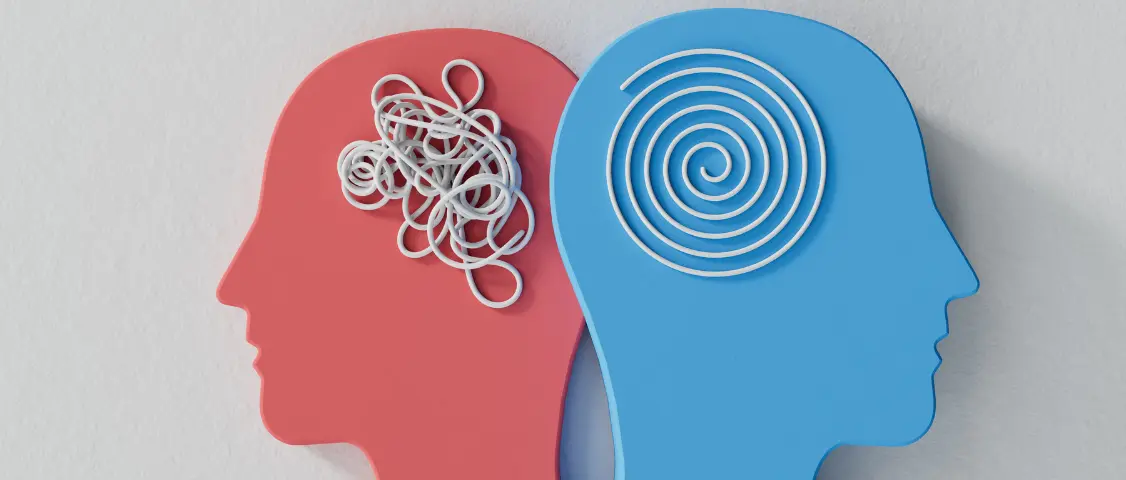For many, the first step towards better mental health and quality of life is psychological testing to determine the presence of symptoms and develop a treatment plan to address those symptoms. However, many individuals may be intimidated or unsure about the psychological testing process or wonder if it’s necessary for long-term mental health.
Psychological testing is an evidence-based process designed to evaluate an individual’s cognitive, emotional, and behavioral functioning in different formats. Psychologists trained in administering and interpreting these tests conduct interviews, collect background information, observe behavior, and administer written tests to evaluate one’s mental health from multiple points of view.
The purpose of psychological testing is to determine the presence of specific symptoms, identify individual strengths, and give individuals a better awareness of their mental landscape. Test results are interpreted to determine if any psychological conditions are present and to develop a personalized treatment plan that helps individuals build self-esteem, learn effective coping strategies, and achieve lasting mental health.In some cases psychological testing helps determine the level of care a person may need, for example, outpatient mental health or more intensive treatment.
The Role of Testing in Managing Mental Health
Psychological testing is often the first step toward improving mental health. By offering a clear and comprehensive view of an individual’s mental well-being, testing provides direct insights towards addressing symptoms and enhancing quality of life. Additionally, this process not only helps individuals manage their mental health but also fosters confidence and self-esteem by focusing on strengths while identifying areas for support.
These tests use evidence-based practices to determine symptoms and their severity with diagnostic tools such as interviews, written tests, or behavioral observation. These measures allow clinicians to make informed judgments about what mental health conditions may be present and what therapeutic strategies may be the most beneficial.
For example, these tests can help distinguish between conditions that share similar symptoms, such as bipolar disorder and major depression, or determine if there are coexisting conditions, such as depression and anxiety. Psychological testing is used to make formal diagnoses of autism and ADHD which is not possible without formal psychological testing. Depending on the condition present, its severity, and individual differences, psychologists can use this data to inform personalized treatment plans that highlight strengths, pinpoint areas for intervention, and teach effective coping strategies for long-term mental well-being.
Who Conducts Psychological Testing?
Psychological testing is typically conducted by licensed clinical psychologists with specialized training in administering and interpreting these assessments. Often these professionals have a doctorate degree, but the main requirements are that a mental health professional is licensed in their state to administer, score, and interpret psychological tests and has experience doing so. In Michigan limited licensed psychologists may administer and interpret psychological tests under the supervision of a fully licensed psychologist. Administering and interpreting tests requires specialized training in addition to a psychology degree and provides the expertise to evaluate various aspects of a person’s mental health and inform appropriate treatment plans.
In some cases, different professionals may handle the administration and interpretation of tests separately, or more specialized professionals, such as clinical neuropsychologists, may perform advanced cognitive tests. While administering the tests can be done by a range of trained professionals, interpreting the results requires more specialized training. Many licensed psychologists are trained to handle the entire process–from administering to interpretation to subsequent therapy. Still, we recommend you ask your test provider about their credentials and if they or another professional will interpret your results or provide subsequent treatment.
What is Involved During Psychological Testing?
Psychological testing involves a comprehensive process that includes interviews, observation, test administration, and interpretation of results. The goal is to provide a multifaceted view of your mental landscape that informs diagnosis and determines the type of treatment.
An integral part of psychological testing is interviews, and the initial process often involves one-on-one conversations between you and the psychologist to collect background information and discuss reasons for seeking testing. These interviews provide essential information for the therapist while allowing them to make direct observations, including nonverbal cues and underlying symptoms that might not be immediately obvious. In some cases, psychologists might also interview or provide questionnaires for close family or friends to get a well-rounded view and rule out potential self-reporting bias.
Following interviews and observation, the psychologist will administer formal tests, including written examinations, cognitive tests, behavioral assessments, and surveys. The data from these tests are compared against standardized benchmarks to provide objective scores that help determine the presence and severity of specific conditions.
However, it’s important to note that these objective measures are only a piece of the puzzle. Subjective measures through interviews and observations offer context to objective results, helping psychologists interpret these numbers and develop a big-picture view of your mental health. For this reason, online questionnaires and self-reported measures that do not involve a licensed trained psychologist are often inaccurate and oversimplify complex conditions rather than offer clarity or a pathway to treatment.
After the testing, the psychologist will analyze the data, integrate it with observational and background data, and create a detailed report. This report outlines your strengths, areas for improvement, and informs diagnosis for specific mental health conditions. From this, a tailored treatment plan can be developed if you choose to engage in therapy, offering a clear and goal-directed path toward better mental health outcomes.
Contact Start My Wellness Today For Accurate and Convenient Psychological Testing
Psychological testing is an essential step for anyone seeking clarity about their mental health and the most effective treatment options. It provides a comprehensive understanding of cognitive, emotional, and behavioral functioning. Results are integrated into a personalized treatment plan that promotes your strengths to build self-esteem, offers actionable strategies to cope with symptoms, and addresses your unique needs.
At Start My Wellness, we understand how critical it is to receive accurate and thorough psychological testing. Our licensed clinical psychologists have years of experience administering tests, interpreting results, and developing personalized treatment plans for lasting mental health. We are committed to providing you with the information and guidance you need to embark on the journey to better mental health, and we offer online appointments for individuals across Michigan.
If you’re ready to begin psychological testing, contact us today at (248)-514-4955 and meet our psychologists to get started on a personalized path to well-being.
Sources
- Start My Wellness: Psychological Testing
- American Psychological Association: Understanding Psychological Testing and Assessment
- National Library of Medicine: Overview of Psychological Testing
- Start My Wellness: Exploring Psychological vs. Neuropsychological Tests: Key Differences
- Start My Wellness: 10 Warning Signs of a Bad Autism Evaluation

Author: Anton Babushkin, PhD
Looking for a Therapist? Start My Wellness has highly experienced Licensed Therapists that are currently accepting new patients.


